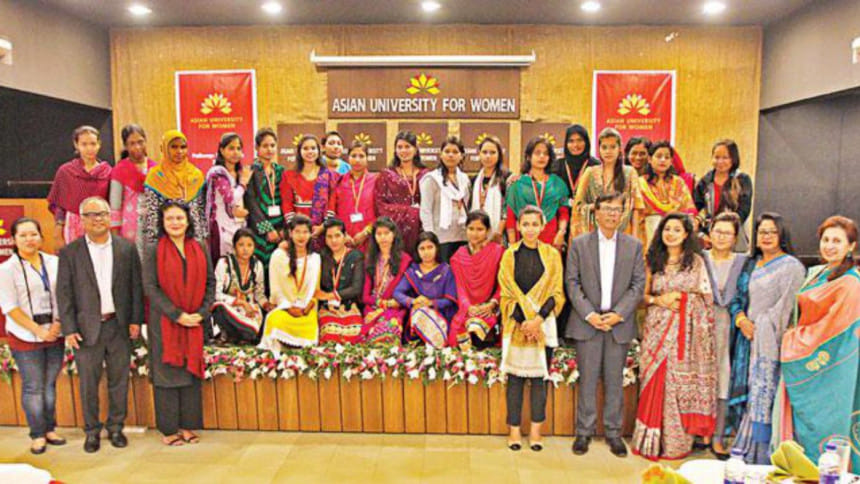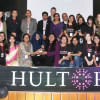My Heroes

Chittagong airport is small in size. So it's easy to spot someone special. A tiny, 'special' woman was holding a placard in her hand, waiting to drive us down to the campus of the Asian University for Women. While we got into the car, I noticed her well-manicured hands and watched her with extreme curiosity while she steered the huge van through the crowded streets of the port city. She spoke excellent Bangla and had reasonable proficiency in English. Smartly dressed in a shirt and a pair of tailored trousers, Annie looked efficient.
The journey from the airport to the main campus of AUW took almost an hour and a half. The ride evoked a lot of amusing food for thought, every time we looked at billboards pledging a green Chittagong. The smog in the city was far from being inviting and the city looked dilapidated in every sense of the word. However, reality altered as soon as we stepped into the building. The happy campus buzzed with academic excitement. While going up to the 6th floor auditorium, I bumped into a Vietnamese student, pretty and petite. Sturdy with a backpack, she looked as if she were completely at home in the campus. But then, just students from 16 Asian countries including Vietnam, China, Cambodia, India, Pakistan and Afghanistan were not what made the school special. What set the university apart from the rest of the private academic institutions was the sheer fact that they had made place for 22 young female garment workers from 5 factories and had decided to give an opportunity for them to graduate to the next level in their lives.
The auditorium, packed with the faculty and the students, looked stunning. While alums from past sessions took the stage to address the audience, we waited to be introduced to the 22 brave women from the readymade garment industry who had ventured to become Pathways Scholars of Asian University for Women. While they all stood up and got introduced from their individual tables, I couldn't have told the difference between the regular students and them. They did not look any different. Yet they were. Their stories were unique and their bravery incomparable.
Towards the middle of last year, a team of AUW academicians came and talked to our workers and sensed their interest in higher studies. Garment workers, who spend 8-10 hours a day toiling behind sewing machines generally only dream of earning a little bit more and nothing else. Handling rent issues, kids, husbands, in-laws, daily chores are all part of their lives. The dream of pursuing higher studies is not even in their remotest agenda. But surprising all of us, quite a few women expressed interest and agreed to be tested by the university. All I had to do was provide wages for the selected women for five years, as they would have to go through an extra year of coping with the academic scene. The rest four would be the usual academic setting for them with the university providing free tuition and boarding. Wasting no time, the faculty set a question paper and conducted the admissions test in our factories and within September, we knew that five of our own workers had been selected. While the news of selection was overwhelming, three of them came forward and refused the acceptance. Their families and their husbands were unwilling to let them go to Chittagong. But two of them stuck to their decision and left Dhaka on January 3 this year, in search of their new lives.
On January 24, 2016, in the auditorium of the Asian University for Women, Shathi and Rokeya sat amongst the other 20 workers with pride. Shathi's father was a day labourer, but had always wanted his daughter to be educated. So she finished school, but since her father was unable to bear her cost of education, her family arranged her to be married to a wealthy man twice her age. Shathi finally got admitted to college and fell in love with another man, divorced her husband, and joined our factory. Rokeya's story is somewhat similar and yet more tragic. Rokeya is a strikingly beautiful woman, with a dark complexion. With two sisters, one brother and parents to support, Rokeya joined our factory in 2012 as a "needlewoman" and got married. Her husband, instead of supporting her, humiliated her and subjected her to many medical tests. Unable to establish any disease, her husband finally told her that he would not live with a woman as dark as she was. Rokeya, the "dark" woman, the "ugly duckling" is possibly one of the few truly beautiful people I have ever come across in my life.
I would say that an overwhelming majority of South Asian men are chauvinists. In a scenario like this, campaigns become a virtual reality and on ground, not even a single woman ventures out to say that while she prepared the entire household for the day, she went unnoticed. But I salute women, who brave the vision of being seen, heard and acknowledged, without whom the world would not regenerate. I salute my Rokeya and Shathi, who amongst the other 20 women have been able to reap the seeds of hope amongst the three million women engaged in the readymade garment sector of this country. I add "my" Rokeya and "my" Shathi, as I don't want to deprive myself of the pride of being responsible for them. I add "my" because the achievements of these two extraordinary women are one of the fewest things I have been proud of in all my nineteen industry years.
The writer is Managing Director, Mohammadi Group.

 For all latest news, follow The Daily Star's Google News channel.
For all latest news, follow The Daily Star's Google News channel. 





Comments